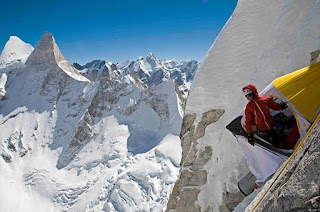Director/Producer team Elizabeth Chai Vasarhelyi and husband Jimmy Chin couldn't have written the story that unfolded. They captured some incredible footage up on the mountain, footage that could only be achieved by expert climbers who doubled up as spectacular photographers. We were immediately captivated by the friendship, expertise and adventure of our three main characters and all through the lenses of a 5D and a handicam! (eat that camera snobs).
 |
| adventureblog.nationalgeographic.com |
The film captured moments of immense jeopardy. We see fingers and toes suffering trench-foot, we watch high-winds bombard a tent suspended 16,000ft in the air, we watch our friends as they suffer huge physical and psychological knock-backs and battle immensely dangerous surroundings. It really is an incredible portrait of human achievement, championing the height of what we can achieve through such devotion, spirit and perhaps a little insanity.
 |
| theclymb.com |
Vasarhelyi revealed that husband Jimmy had reservations about featuring as a character in the documentary due to his own modesty but she had managed to convince him that he was an integral part of the sensational story of man vs. mountain. Thank goodness that she did! Jimmy soon became the loveable character among the trio, cracking jokes at times of uncertainty and proving forever the optimist. She did however pass on the revelation that Jimmy regretted swearing on camera –no judgements passed at all though Jimmy, have no fear there!
 |
| merufilm.com |
Of course there’s Renan, a man who left his heart at the top of a mountain and couldn’t rest until he’d climbed to claim it back. He showed remarkable human strength and determination, t was like watching a Hollywood movie at times. Lastly, there’s Conrad, the daddy of the group. A man who is highly respected in his profession and highly regarded by the cinema audience too. He is quick to warm to and without giving away the final moments of the film, proves to be a gentleman. He is a man that pushes ego aside and strips himself right down to reveal a genuine wanderer with a firm heart and incredible talent. He humbles us further with the fact he submitted Everest without Oxygen just 3 months after the Meru climb!
 |
| merufilm.com - Jimmy Chin Photography |
The film took 7yrs to make, throwing out two previous versions and finishing just 10 days before the film’s Sundance submission deadline. Co-director Jimmy insisted also that authenticity was essential in the edit, down to the very music tracks they would listen to on their Meru climb – proving pricey at the stage of music rights clearance. The story that was finally told at Sheffield’s Library Theatre deserved the big screen it featured on. It is expertly edited to tell aspects of a story that sees accidents, near-death escapes, incredible resilience and a rather beautiful bromance that saw me in tears. (Although at the moment of Ramon’s neck crack it did feel a little like we’d switched genre to a horror, prompting an outbreak of gasps from the Sheffield audience). Despite this, the film really is a story of man vs mountain that leaves us rushing to get our crampons on and resembles much of what we consider a part of the human story.
 |
| merufilm.com - Jimmy Chin Photography |
Meru is released in UK cinemas later this year and I highly recommend it, particularly to any adventurers, climbers or outdoor athletes!


